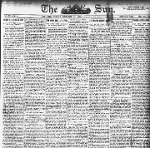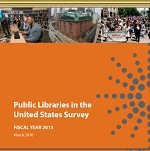Blog Posts | October 14, 2016
Share ThisBy Emily Reynolds
Program Officer, IMLS Office of Library Services

http://chroniclingamerica.loc.gov/
IMLS recently announced 41 awards made through the National Leadership Grants for Libraries program (NLG), the Laura Bush 21st Century Librarian program (LB21), and Sparks! Ignition Grants for Libraries program (Sparks). Among these awards, we are pleased to support a number of projects exploring emerging digital skills and roles for librarians. The three projects highlighted in this post represent a total investment of more than $580,000. Click the log number for each grant to access more information, including selected documents from each grant proposal.
As digital collections held by libraries and archives expand, so do the possibilities for intensive computational use and analysis. It is also increasingly important for libraries to be empowered to use data to describe and understand their activities, as more areas of library practice become data-driven. This work contributes to a growing portfolio of IMLS-funded work in this area, including a grant made last year to the University of Illinois (RE-00-15-0112-15) and many of the grants awarded through the international Digging into Data program.
Enhancing computational access to collections
Two of the NLG grants awarded this cycle will support analysis and use of digital collections in a variety of ways, to benefit librarians and archivists, as well as end users. The University of Nebraska-Lincoln (LG-71-16-0152-16) received an NLG research grant of $462,317 to support a project by the Image Analysis for Archival Discovery (Aida) research team. The project will investigate the use of image analysis as a method for content identification, description, and information retrieval in digital libraries and other digitized collections. Work will focus on identifying poetic and advertising content in digitized historical newspapers. Using a machine-learning approach, the project will result in an intelligent computational system that can process digital images and identify these specific types of content. The tools and methods produced will improve libraries’ capacity to identify digital content at and below the item level, as well as increase access to information currently obscured in large digital collections.
Further supporting the concept of collections as data, The University of California Santa Barbara (LG-73-16-0096-16) received a $100,000 NLG national forum grant to hold a series of meetings to develop strategies around library collections that support computationally-driven research and teaching. Partner organizations include the University of Pennsylvania, University of North Carolina Chapel Hill, Penn State University, Emory University, and Texas A&M University. Meeting attendees will include librarians, archivists, museum professionals, technologists, researchers, and practitioners. The meetings will lead to the creation of a framework to support library collections as data, the identification of methods for making computationally-amenable library collections more discoverable, use cases and user stories for such collections, and guidance for future technical development.
Communicating data about libraries

The State Library of Ohio (SP-02-16-0008-16) received a $25,000 Sparks grant to develop and pilot “Libraries by the Numbers,” a lightweight data visualization tool. This web-based tool will enable public libraries across Ohio to create customized infographics based on their own unique library statistics collected for the IMLS Public Libraries Survey. With these graphics, public libraries across the state will be able to share statistics with their staff, boards, and the public in an easy-to-understand format. The project will increase librarians’ understanding of their library statistics and allow them to more effectively communicate information about their library and its services.
